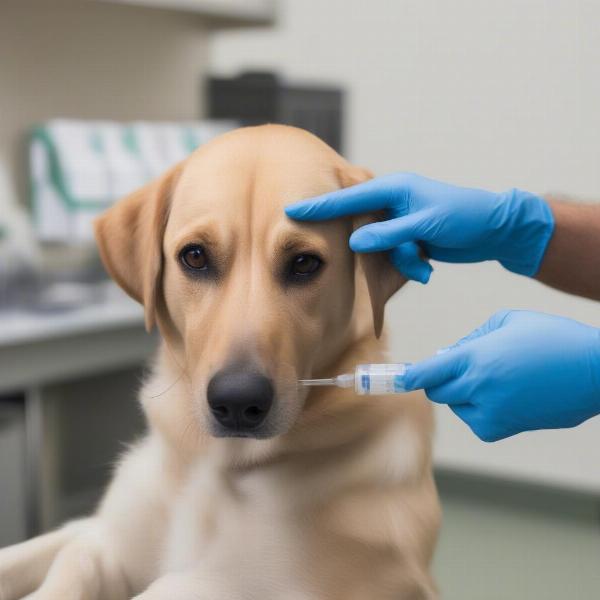The L4 vaccine, often referred to as the Leptospirosis vaccine, is a crucial component of your dog’s preventative healthcare. Leptospirosis is a serious bacterial infection that can affect both dogs and humans, making this vaccine particularly important. This article will delve into the details of the L4 vaccine, explaining its importance, potential side effects, and answering common questions dog owners have.
What is Leptospirosis and Why is the L4 Vaccine Important?
Leptospirosis is a zoonotic disease, meaning it can be transmitted between animals and humans. It’s caused by bacteria of the genus Leptospira and is often spread through contaminated water or urine. Dogs can contract leptospirosis by drinking from puddles, streams, or other water sources that have been contaminated by infected wildlife. The L4 vaccine protects against four common serovars (variations) of the Leptospira bacteria, offering a wider range of protection compared to older versions of the vaccine. Without the L4 vaccine, dogs are at risk of developing severe kidney and liver disease, and in some cases, it can be fatal. Protecting your dog also protects your family from this potentially dangerous disease.
 Dog receiving L4 vaccine
Dog receiving L4 vaccine
Understanding L4 Vaccine Side Effects
While the L4 vaccine is generally safe, some dogs may experience mild side effects. These can include lethargy, soreness at the injection site, and decreased appetite. These side effects are usually temporary and resolve within a few days. More serious side effects, like allergic reactions, are rare but possible. If you notice any unusual symptoms after vaccination, such as facial swelling, difficulty breathing, or hives, contact your veterinarian immediately.
L4 Vaccination Schedule and Recommendations
Puppies typically receive their first L4 vaccine around 8-10 weeks of age, followed by booster shots every 3-4 weeks until they are around 16 weeks old. Adult dogs who have never been vaccinated will require an initial dose followed by a booster a few weeks later. 6 in 1 vaccine for dogs often include the L4 component. Your veterinarian can advise you on the best vaccination schedule for your dog based on their age, lifestyle, and risk factors. For instance, dogs who spend a lot of time outdoors or live in areas with a high prevalence of leptospirosis may require more frequent boosters.
Is the L4 Vaccine Necessary for All Dogs?
While the core canine vaccines are recommended for all dogs, the necessity of the L4 vaccine depends on your dog’s lifestyle and geographical location. seven in one dog vaccine might be an alternative. Talk to your veterinarian about your dog’s risk factors. They can assess your dog’s individual needs and determine whether the L4 vaccine is appropriate.
How Long Does the L4 Vaccine Last?
The L4 vaccine typically provides immunity for about 12 months, which is why annual boosters are recommended. However, the duration of immunity can vary depending on the dog and their exposure to the bacteria.
Conclusion
The L4 vaccine is an essential tool in protecting dogs from the serious and potentially fatal disease, leptospirosis. While side effects are usually mild and temporary, it’s important to monitor your dog after vaccination and contact your veterinarian if you have any concerns. Discussing your dog’s lifestyle and risk factors with your veterinarian will help you make informed decisions about their vaccination needs and ensure their long-term health and well-being. Don’t hesitate to reach out to your vet for further guidance on the L4 vaccine.
FAQ
-
What does the L4 vaccine protect against? The L4 vaccine protects against four common serovars of the Leptospira bacteria that cause leptospirosis.
-
Is the L4 vaccine safe for puppies? Yes, the L4 vaccine is generally safe for puppies, though they will require a series of boosters to build full immunity.
-
Can my dog get leptospirosis even if they are vaccinated? While the vaccine provides excellent protection, it’s not 100% effective. There’s a small chance a vaccinated dog can still contract the disease, but their symptoms will likely be milder.
-
How much does the L4 vaccine cost? The cost of the L4 vaccine can vary depending on your location and veterinary clinic.
-
What are the signs of leptospirosis in dogs? Signs of leptospirosis can include fever, vomiting, diarrhea, jaundice, muscle pain, and increased thirst.
-
Can humans get leptospirosis from dogs? Yes, leptospirosis is a zoonotic disease, meaning it can be transmitted from animals to humans.
-
How is leptospirosis treated in dogs? Leptospirosis is treated with antibiotics and supportive care.
ILM Dog is your trusted resource for comprehensive dog care information. We specialize in providing expert advice on breed selection, health and medical care, training, nutrition, grooming, and much more. 10 in 1 dog vaccine and other important topics are covered in detail on our site. To learn more about our services and how we can help you provide the best possible care for your canine companion, contact us at [email protected] or +44 20-3965-8624. ILM Dog is committed to helping dog owners worldwide make informed decisions about their pet’s health and well-being.